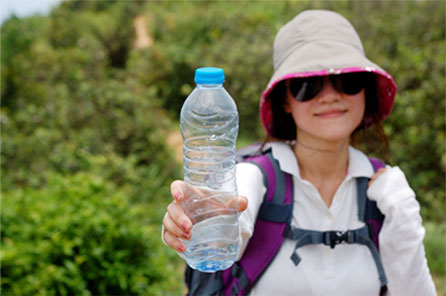Prepare
Here are some suggested guidelines to follow in preparation for your visit. Florida's natural environment occasionally presents harsh conditions. Temperature extremes, insect pests and summer lightning storms are a few examples. You will improve your chance of having an enjoyable experience on Polk County Environmental Lands by planning ahead.

Natural Areas Etiquette
- Dispose of waste in the designated trash receptacles.
Feed yourself, not the animals. Potato chips, salted nuts, crackers and cookies are not what nature intended as a healthy diet for wildlife. When wild animals become dependent on handouts, they may lose their natural fear of humans and become aggressive and dangerous. - Leave what you find.
While exploring environmental lands, we hope you will encounter many of the interesting things found in nature, such as flowers, feathers, and plants. Please do not remove anything you didn't bring in with you, so that other visitors may enjoy them too. - Let nature's sounds prevail.
Loud noises such as radios scare off wildlife and may disturb other visitors. Please be considerate of those who want to "get away from it all" and enjoy the serenity and quiet. Avoid loud voices and noises. - No Pets Allowed at Circle B Bar Reserve.
Please take note that there are no pets allowed at Circle B Bar Reserve. Many of our other Environmental Lands properties are open to pets, as long as they remain on their leash while visiting with you. If you have any questions feel free to call (863) 668-4673 x205. We will be more than happy to answer any of your questions. - Respect wildlife.
Every animal has its limit of how close you can approach before it flees. Energy that the animal uses to escape human disturbances is no longer available for other activities, such as escaping predators or raising young. You are a visitor to the animal's home, so please respect its space. - Travel only on established marked trails.
Designated nature and hiking trails are created to allow your exploration of natural areas. Going "off road" can damage delicate plants and may cause hikers to become lost, especially on larger sites.
Tips to Remember
- Binoculars and telephoto lenses can provide close-up views of a variety of wildlife.
Safe wildlife viewing can be done more easily if you have magnifying lenses such as binoculars. Often, wildlife has not lost its fear of humans and flees when humans approach. - Bring plenty of water with you.
Potable drinking water is not available in natural areas. - Hike with a group when possible.
If you choose to hike alone, let someone know where you are going and when you expect to return. Cellular phone signals may be lost in remote areas of the county. - Natural trails can be wet and muddy.
Trails in natural areas may become wet and muddy during the rainy season and during periods of heavy rainfall. Please plan accordingly. - Protect yourself from the Florida sun.
Wear sunscreen and appropriate clothing. Long pants, a hat, sunglasses and closed-toe shoes are recommended. - Wear insect repellent.
Mosquitoes, biting flies, ticks and chiggers are present in natural areas during the rainy summer season (usually June - September). Fire ants are also present throughout the year in higher and drier areas. Wear long pants and long-sleeved shirts or insects repellent to avoid being bitten. Avoid wearing perfume or scented lotion.